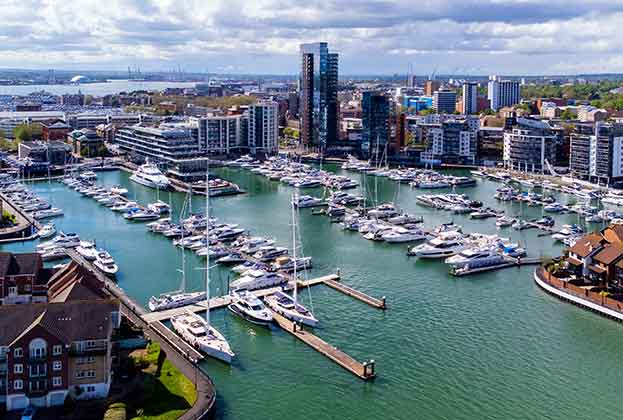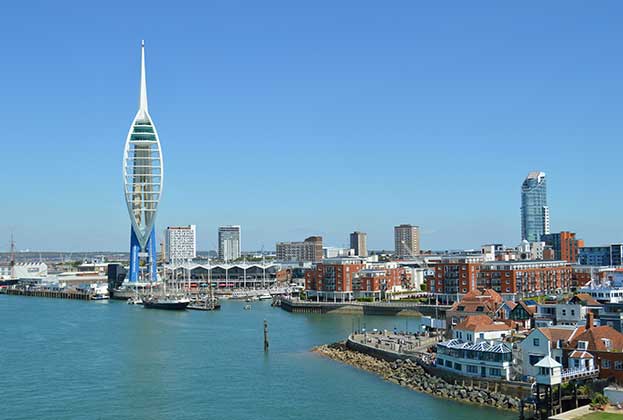Attracting and retaining the best talent is central to creating innovation-led growth in the Central South. How can the region retain the skilled talent required for a diverse workforce?
Graduate retention misses out on a 1st
With a combined total student population of 83,000 and six major universities, Southampton, Portsmouth and BCP make a huge contribution to both the cultural offer and knowledge-based sectors across the area. They also have a diverse workforce in terms of skills and qualifications, comparable with the national average.
Only 19%, equal to 4,200 graduates, end up staying on for work where they studied. All three rank in the bottom half in terms of graduate retention, when compared to all UK cities with student populations of over 20,000 people. However, the picture is varied. Bournemouth ranks the highest at 18th, with a graduate retention rate of 27%. This compares with Portsmouth and Southampton, who rank 26th and 30th, respectively.
Many other regional cities do much better. For example, Manchester retains 50% of graduates each year, Glasgow 41% and Birmingham 34%. However, other cities in the south with similar student populations, such as Brighton, Canterbury and Exeter, have comparable graduate retention rates to the Central South.
Graduates in higher-value sectors are moving away
Half of all graduates, around 5,200 graduates, who enter the jobs market each year across Southampton, Portsmouth and BCP, enter either the human health and social work sector or the education sector, exceeding the national average of 36%.
High-value sectors such as ‘professional, scientific & technology’, ‘information & communication’ and ‘financial & insurance,’ central to innovation-led growth, are all under-represented by graduates relative to the national average. However, there is some variation, with BCP outperforming in ‘financial & insurance’ with 6% of graduates entering the sector, compared with Portsmouth’s 0.6%.
It isn’t the case that the universities aren’t creating the skilled graduates to enter these high-value employment sectors. It is likely that the lack of employment opportunities is driving graduates away in search of work elsewhere. Across the three core high-value sectors stated above, around 1,550 graduates are employed in either Southampton, Portsmouth or BCP per annum. However, 4,900 graduates from those same places move away and take up jobs in those same high-value industries.
It is no surprise the biggest destination for university leavers is for London. Nearly a quarter of all graduates end up in London for work. In the University of Southampton’s case, the 20% of leavers who live in London post-study is more than double the 10% that stay in the city.
Research and innovation
Whilst also providing skills to graduates, universities can play a unique role in business startup support. Since 2000, the University of Southampton, a leading Russell Group institution with a focus on research has formed 77 ventures and 40 formal ‘spinouts’. It does this by providing physical space and support for startups and entrepreneurs through business incubators and innovation hubs.
The Southampton Science Park has benefited from close collaboration with the University of Southampton and local government. This science and innovation park provides a platform for technology and knowledge-based businesses to thrive, with office space and facilities providing for a wide range of technology-focused businesses.
.jpg)
It is also home to Southampton SETsquared, an enterprise partnership between the Universities of Bath, Bristol, Cardiff, Exeter, Southampton and Surrey, which helps to maximise the entrepreneurial and commercial potential of these six Universities. It has contributed nearly £15.7bn to the UK economy, supported 6,500 companies and helped create 15,600 jobs since its inception in 2002.
Successful collaboration between Southampton University and local government and economic development agencies often relies on strong communication, a shared vision for the region’s economic future, and a commitment to long-term partnerships. These efforts can result in a thriving local economy, increased job opportunities, and a culture of innovation and entrepreneurship in the region.
The role of the Solent Freeport
The Solent Freeport has a fundamental role in supporting organisations seeking to tap into the talent emerging from local universities, other educational bodies and the wealth of skills, particularly in the marine and aviation sectors. Within the Freeport, Tax Zone status is designated to a number of sites, including Fawley Waterside, Navigator Quarter (at Southampton Airport) and Southampton Docks. This is designed to attract innovative and technology-based organisations through incentives, including business rates relief amongst others. Attracting these organisations will greatly improve graduate retention within the Central South.
Read the articles within Central South: unlocking capacity for growth – Q1 2024 below.
.jpg)

